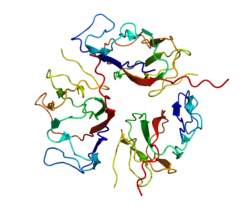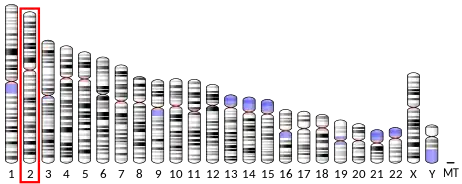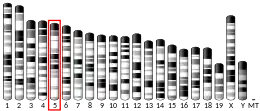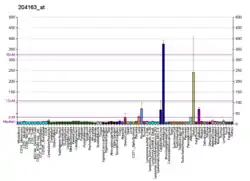EMILIN1
Elastin microfibril interfacer 1 (EMILIN-1) is a protein that in humans is encoded by the EMILIN1 gene.[5] It is the best characterized member of the EMILIN family of extracellular matrix glycoproteins.
References
- GRCh38: Ensembl release 89: ENSG00000138080 - Ensembl, May 2017
- GRCm38: Ensembl release 89: ENSMUSG00000029163 - Ensembl, May 2017
- "Human PubMed Reference:". National Center for Biotechnology Information, U.S. National Library of Medicine.
- "Mouse PubMed Reference:". National Center for Biotechnology Information, U.S. National Library of Medicine.
- "Entrez Gene: EMILIN1 elastin microfibril interfacer 1".
Further reading
- Doliana R, Mongiat M, Bucciotti F, et al. (1999). "EMILIN, a component of the elastic fiber and a new member of the C1q/tumor necrosis factor superfamily of proteins". J. Biol. Chem. 274 (24): 16773–81. doi:10.1074/jbc.274.24.16773. PMID 10358019.
- Doliana R, Canton A, Bucciotti F, et al. (2000). "Structure, chromosomal localization, and promoter analysis of the human elastin microfibril interfase located proteIN (EMILIN) gene". J. Biol. Chem. 275 (2): 785–92. doi:10.1074/jbc.275.2.785. PMID 10625608.
- Mongiat M, Mungiguerra G, Bot S, et al. (2000). "Self-assembly and supramolecular organization of EMILIN". J. Biol. Chem. 275 (33): 25471–80. doi:10.1074/jbc.M001426200. PMID 10821830.
- Sterzel RB, Hartner A, Schlötzer-Schrehardt U, et al. (2000). "Elastic fiber proteins in the glomerular mesangium in vivo and in cell culture". Kidney Int. 58 (4): 1588–602. doi:10.1046/j.1523-1755.2000.00320.x. PMID 11012893.
- Doliana R, Bot S, Mungiguerra G, et al. (2001). "Isolation and characterization of EMILIN-2, a new component of the growing EMILINs family and a member of the EMI domain-containing superfamily". J. Biol. Chem. 276 (15): 12003–11. doi:10.1074/jbc.M011591200. PMID 11278945.
- Spessotto P, Cervi M, Mucignat MT, et al. (2003). "beta 1 Integrin-dependent cell adhesion to EMILIN-1 is mediated by the gC1q domain". J. Biol. Chem. 278 (8): 6160–7. doi:10.1074/jbc.M208322200. PMID 12456677.
- Strausberg RL, Feingold EA, Grouse LH, et al. (2003). "Generation and initial analysis of more than 15,000 full-length human and mouse cDNA sequences". Proc. Natl. Acad. Sci. U.S.A. 99 (26): 16899–903. Bibcode:2002PNAS...9916899M. doi:10.1073/pnas.242603899. PMC 139241. PMID 12477932.
- Verdone G, Colebrooke SA, Boyd J, et al. (2004). "Sequence-specific backbone NMR assignments for the C-terminal globular domain of EMILIN-1". J. Biomol. NMR. 29 (1): 91–2. doi:10.1023/B:JNMR.0000019460.94913.6a. PMID 15017143. S2CID 38779069.
- Gerhard DS, Wagner L, Feingold EA, et al. (2004). "The status, quality, and expansion of the NIH full-length cDNA project: the Mammalian Gene Collection (MGC)". Genome Res. 14 (10B): 2121–7. doi:10.1101/gr.2596504. PMC 528928. PMID 15489334.
- Wang L, Zhu YF, Guo XJ, et al. (2006). "A two-dimensional electrophoresis reference map of human ovary". J. Mol. Med. 83 (10): 812–21. doi:10.1007/s00109-005-0676-y. PMID 16021519. S2CID 6644433.
- Rual JF, Venkatesan K, Hao T, et al. (2005). "Towards a proteome-scale map of the human protein-protein interaction network". Nature. 437 (7062): 1173–8. Bibcode:2005Natur.437.1173R. doi:10.1038/nature04209. PMID 16189514. S2CID 4427026.
- Lewandrowski U, Moebius J, Walter U, Sickmann A (2006). "Elucidation of N-glycosylation sites on human platelet proteins: a glycoproteomic approach". Mol. Cell. Proteomics. 5 (2): 226–33. doi:10.1074/mcp.M500324-MCP200. PMID 16263699.
- Otsuki T, Ota T, Nishikawa T, et al. (2007). "Signal sequence and keyword trap in silico for selection of full-length human cDNAs encoding secretion or membrane proteins from oligo-capped cDNA libraries". DNA Res. 12 (2): 117–26. doi:10.1093/dnares/12.2.117. PMID 16303743.
External links
This article is issued from Wikipedia. The text is licensed under Creative Commons - Attribution - Sharealike. Additional terms may apply for the media files.





